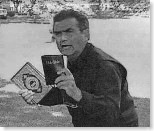It’s the kind of spring morning that confuses itself with early fall. Hardly knowing its place or mode of presentation…it asks, “Should I be about receding or resurrecting?” And I with it, ask, what’s my place in this brown-grass-beside-cracked-sidewalk day?
Out of habit I’ve pointed myself to a door and a desk, but eight blocks is a long way on a morning such as this, and I’m disoriented. Where to find direction? The sky is closed for reading, its entrails sealed behind a splotchy blue grey hide. The cards falling from my sleeve are all jokers. And no tea leaves have escaped their perforated cells to rest on the bottom of cups. Where are the signs, my signs?
Yesterday I saw them and knew my place. Yesterday I felt somehow adjusted–kneeling beside a man bulky from folds of clothes, who smelled street-sour, and whose fingers were black from removing tobacco from butts. He came in half way through the Easter liturgy, sat down and rolled a cigarette, joining the six of us for the early service. When it was time, he was first at the eucharist rail and I steered toward him, lowering myself beside his already kneeling frame. He had the face of a pugilist…a George Chuvalo with long thick grey hair, stiff from dust.
The lot of us–an older man in a suit, a smartly-dressed business woman, an elderly woman with a broach, a middle-aged woman in flowered blouse, and a younger man in blue jeans who knew his way around the Book of Common Prayer– lined up like robins, mouths open, waiting for a wafer, some wine and over our heads, the sign. When Eucharist was done the man got up and not waiting for any closing hymns or prayers, walked out of the sanctuary, presumably through the front doors to light up his cigarette. Maureen, the presiding priest, thanked me for coming and I walked out, my way marked for me by a small wooden table covered with flowers in bloom.
Today the only things blooming are indoor daffodils on a counter beside a cash register. And the only thing holding them up is hairspray. They will have to do.


